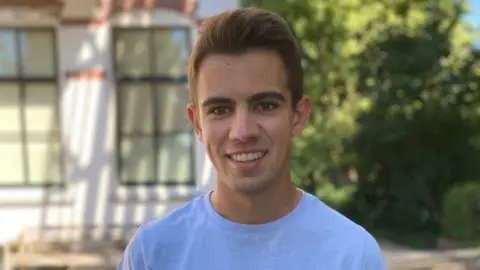A-levels: Students told most will get first-choice university place

 BBC
BBCTeenagers applying to go to university are being reassured that most of them will get their first choice place.
England, Wales and Northern Ireland A-level grades are expected to fall when results are announced on Thursday.
But the BBC has seen a letter being sent to students from exams regulator Ofqual and university admissions service UCAS saying the marks should not be compared with those from 2021.
And Ofqual says universities are fully aware of how grades were awarded.
Competition for some courses and universities has been expected to be tougher, but the letter says students will have lots of options for further study.
Overall grades for A-levels are expected to be lower than 2020 and 2021, when exams were cancelled and teacher assessment led to a boom in top grades.
This year, grades will be roughly halfway between those of 2021 and 2019.
Dr Jo Saxton, whose job at Ofqual is to ensure exam results overall are fair and consistent in England, said she had met universities in recent days to make sure they understood how students' grades were being awarded this year.
"Tempting as it is to compare grades with 2021, the meaningful [comparison year] is 2019 when exams were last sat," she said.
Joe, 18, from Manchester, is among those waiting for A-level results this year, the first major public exams most students have taken because all GCSE exams were cancelled in 2020.
He hopes to study English Literature at the University of Liverpool and said he understands the plan to get grades halfway back to 2019 levels.
Even so he said it feels "a little bit harsh" for a year group that has been through so much, but "everyone is in the same boat so you can't complain too much about how it has been handled".
The joint letter to students from Dr Saxton and the chief executive of Ucas, Clare Marchant, tells students not to worry that lower grades this year will put them at a disadvantage.
"In 2019, when exams last went ahead, around three-quarters of UK 18-year-old applicants were placed at their first choice. Come results day this year, Ucas again expects most students will secure their place at their first choice," they wrote.
Tough competition
In 2019, only 21% got the grades predicted by their teachers, but 86% ended up with a university place through Ucas.
But for some students, the competition will be tougher than ever before.
Medicine is one of a handful of courses in England where numbers are limited by the government, because the cost is heavily subsidised.
In 2020 and 2021 the government lifted the cap on numbers, which led last year to 10,460 medical school places being accepted across the UK.
But this year the cap is returning in England, which means about 7,500 places will be available.
Tia, 18, from Leicester, wants to study medicine at University College London and is "incredibly nervous" about her results.
"As soon as August hit, I started panicking a bit more," she said.

To apply for medical school there is a separate test called the University Clinical Aptitude Test (Ucat), which Tia sat in addition to her A-level exams.
In 2019, 29,446 students across the UK took the test, but by 2021 when students were applying it was 37,397 because the pandemic had led to an increased interest in training as a doctor.
The Medical Schools Council is calling for a long-term increase in the number of medical school places to meet the demand in the NHS.
Competition for places at the most academically selective universities could also feel greater this year, although most of the Russell Group universities contacted by the BBC said they would only know how many places they are putting into clearing on results day.
Ucas said there are about 30,000 courses overall in clearing, and students could put themselves in the "strongest possible position" by thinking ahead and having a plan B.
